AI Agent Examples: 12 Real-World Applications


AI agents go beyond traditional chatbots by taking real actions across systems—automating support, qualifying leads, managing onboarding, and completing multi-step workflows. This blog explains what AI agents are, the four main types, how they differ from chatbots, and 12 real-world business applications across industries like e-commerce, healthcare, finance, and operations. The result is faster processes, lower costs, and scalable automation that drives measurable business impact.
AI agent are already part of daily business work. Today, companies are using AI agents to:
The big difference? These agents don’t just assist they can also take actions. They can move across systems, follow steps, and deliver real results on their own.
This blog covers the four main types of conversational agents, how business using them in real scenarios, and how you can track & implement in your organisation.

AI agents are intelligent software systems designed to process inputs, make decisions, and complete tasks with minimal human involvement.
In conversational AI, these agents power fast, consistent, and context-aware interactions across chat, voice, and digital channels.
You can add a dedicated section to go deeper into Knowledge-Based Agents, showing how they use your data, improve accuracy, and power smarter support experiences. Let me know if you want the next section focused on knowledge-based agents.
| Factor | AI Agents | Chatbots |
|---|---|---|
| Autonomy | Operates with independent reasoning to achieve goals. AI agents analyse context, make decisions, and perform actions across tools without constant human input. They can manage workflows end-to-end, adapting their next steps based on outcomes. | Responds to specific triggers or user queries. Chatbots rely on pre-set logic or keyword matching and cannot decide or act beyond the conversation flow. Their function ends once the response is delivered. |
| Integration | Connects with multiple enterprise systems and APIs simultaneously. For example, an AI agent can access CRM data, check inventory, and trigger billing—all in one process. It acts as an orchestration layer that brings data and actions together. | Works inside a single application or interface. A chatbot can answer queries or send updates but cannot combine data from different sources. It functions as a front-end interaction tool rather than a workflow engine. |
| Learning | Continuously improves through interaction and feedback. AI agents learn user preferences, detect context changes, and refine their decisions over time. They can self-correct errors and enhance efficiency with repeated tasks. | Follows predefined scripts or responses without improvement. Chatbots cannot update or refine their performance unless manually reprogrammed. Their capability remains fixed at deployment. |
| Use Cases | Suitable for complex business processes that involve reasoning and multiple actions. | Designed for simple and repetitive tasks. It helps with communication but not execution. |

AI agents are actively changing how businesses run and how we manage everyday life. Below, I’ve listed 12 real-world examples of how they are making a meaningful impact in 2026.
When you reset your password, check an order at midnight, or chat on a website, an AI agent is usually helping you. Support teams use AI agents to:
It result in faster response to users, more productive & efficient teams.
Ever received a reminder about items left in your shopping cart? That’s an AI agent at work.
Online stores rely on AI agents to:
This drives more sales and creates a better shopping experience.
AI agents help sales and marketing teams reach the right audience and close more deals.
| Use Case | What It Does |
|---|---|
| Lead Qualification & Prioritisation | Analyses incoming leads and routes high-intent prospects to sales teams. |
| Content and Campaign Automation | Generates emails, blogs and social content; suggests improvements. |
| Cart Abandonment & E-commerce Support | Follows up with cart abandoners and provides product info and suggestions. |
| Pipeline Management & Forecasting | Reviews sales activity and predicts outcomes or deal risks. |
| Ad Creative Generation & Optimisation | Creates ad creatives, help runs A/B tests and refines designs for better performance. |
| Sentiment-Aware Interaction | Detects tone and emotion in customer conversations to guide agent response. |
Higher conversion rates and more time spent building relationships.
Hospitals and clinics use AI agents to deliver better patient care.
Impact: Reduced waiting times and higher accuracy in treatment.
AI agents now play a central role in managing daily business operations for companies of all sizes. They help teams stay organised, automate routine work, and keep everything running on time.
In real use, AI agents:
As a result, businesses become more efficient, teams collaborate better, and leaders gain clearer insights into what’s happening across the company.
Hotels use AI agents to enhance guest experience.
Result: Guests get quicker service, and hotel staff work more efficiently.
Some of the famous platforms like Netflix and Spotify use AI over the years to improve user experience.
Users find what they like without even typing it leads to higher engagement.
Factories and warehouses use AI agents to keep operations smooth.
Outcome Less downtime, less waste, and better output.
Banks trust AI agents for faster, safer service.
Better financial decisions for customers and lower risk for banks.
Schools and universities adopt AI agents for improved learning outcomes.
It will help teachers spend more time on students equally.
Millions rely on AI-powered virtual assistants daily.
AI agents are becoming an important part of business operations. They help organisations manage information, respond faster, and improve coordination across teams. The adoption is guided by measurable outcomes and practical efficiency.
AI agents manage routine and data-heavy tasks with consistency. By reducing manual steps and improving process accuracy, they lower administrative effort and operational expenses. Most businesses see noticeable savings once workflows are standardised and automated.
AI agents continue working even when teams are offline. They process requests, share updates, and assist users at any hour. This steady availability ensures smooth operations for global customers and internal teams.
When workloads increase, AI agents adjust to handle additional volume without affecting quality. This flexibility helps organisations manage seasonal demand or new projects without major changes to their staffing or systems.
AI agents follow defined logic and deliver consistent results. This precision helps maintain data reliability and reduces the need for repeated checks or corrections. Over time, fewer errors mean more stable workflows and better use of team capacity.
Tasks that once took hours can now be completed in minutes. AI agents manage these operations quickly, keeping projects on schedule and improving response times across departments.
AI agents improve through regular use. Each interaction adds small refinements to their performance. This gradual learning helps them adapt to the organisation’s workflows and provide more relevant support over time.
Businesses in 2026 view AI agents as practical tools for consistency and efficiency. They help teams work with greater accuracy, speed, and focus, creating steady operational value rather than short-term gains.
When deploying AI agents, every business leader eventually asks the same question: Is this investment really paying off?
In 2026, leading organisations find the answer by tracking more than just support metrics. They look beyond ticket deflection and focus on measurable results such as revenue growth, cost savings, and improved operational efficiency across teams from sales to marketing and beyond.
At its core, ROI from AI agents comes down to this:
ROI (%) = (Annual Benefits – Annual Operating Costs) ÷ Annual Operating Costs × 100
But what counts as a “benefit”? In practice, benefits span multiple use cases:
| Use Case | KPI |
|---|---|
| Customer Support | Ticket Deflection Rate, Cost per Resolution, CSAT |
| Sales & Marketing | Lead Qualification Rate, Conversion Lift, Campaign ROI |
| E-Commerce | Cart Recovery Rate, Personalization Uplift, Average Order Value |
| Operations | Task Automation Rate, Error Reduction, Approval Cycle Time |
| Finance | Fraud Detection Rate, Compliance Automation, Processing Speed |
| HR & Onboarding | Time-to-Hire, Automated Training Completion, Employee Satisfaction |
Launching AI agents is no longer a “set it and forget it” exercise. For organizations aiming to unlock real value, a structured playbook is key. Here’s how to move from first pilot to large-scale deployment minimizing risk, accelerating adoption, and delivering measurable impact.
Start with a clear goal what do you want to improve, like support workflows or internal processes?
Then define why it matters. Are you aiming to cut costs, speed up sales, or improve customer experience? Your “why” keeps the focus on real business impact.
Set 2–3 KPIs (see previous table) that tie directly to business outcomes. Quantify your baseline so you can prove improvement.
Choose a process that is high-volume, repetitive, and well-documented. Early wins build trust and momentum.
Form a cross-functional team: business owner, IT/ops, and at least one end-user champion.
Evaluate platforms based on:
Tip: Ask vendors for proof of ROI and real-world case studies.
Deploy in a limited environment (single department, product, or location).
Track live KPIs against your baseline for at least 4–6 weeks.
Gather both quantitative data (e.g., time saved) and qualitative feedback (user satisfaction, pain points).
AI agents improve fastest with real-world data. Review conversation logs, error reports, and user feedback weekly.
Tweak prompts, add new workflows, and automate escalation paths as confidence grows.
Once the pilot exceeds your success criteria:
Treat your AI agents as evolving digital coworkers.
AI agents do more than reply to messages. They can take actions, connect with other tools, and handle tasks like updating records or managing workflows. Chatbots usually only answers based on query.
They handle repetitive tasks like answering questions, sending reminders, and managing data. This saves time and lets your team focus on more important work.
No. Many platforms are designed to be easy to set up and manage, with simple interfaces and guides to help you get started.
Yes. AI agents can connect with CRMs, help desks, databases, and other apps to complete tasks across different systems.
Most platforms use strong security measures like encryption and follow data privacy rules. Always check the vendor’s security practices to make sure they fit your needs.
Yes. They can use data from past interactions to offer recommendations, tailor responses, and make the experience more personal.
No. They’re designed to assist people by taking on repetitive or time-consuming tasks. This lets your team focus on work that requires creativity and human judgment.
They learn from each interaction and improve their responses and actions. This means they can handle more tasks and answer questions more accurately.
Yes. Many AI agents can work in multiple languages, making them useful for businesses that serve customers in different countries.
If your team handles a lot of repetitive work, supports many customers, or manages complex tasks, AI agents can help you save time and work more efficiently.
AI agents are practical tools that help businesses manage everyday tasks. They can handle customer questions, manage data, and connect with other systems. This saves time and lets teams focus on more important work.
Using AI agents can make your business more efficient. They learn from every interaction, which means they get better at their tasks over time. They also help you serve customers faster and more consistently.
If you want to improve how your business works, consider adding AI agents. Start with simple tasks like answering common questions or sending reminders. As your team gets used to them, you can expand their role to handle more complex tasks.
Launch your first use case in minutes, or talk to our team about custom solutions.
They reply fast, reduce workload, and grow with your team.
No credit card needed • 7-day free trial • The Complete AI Solution
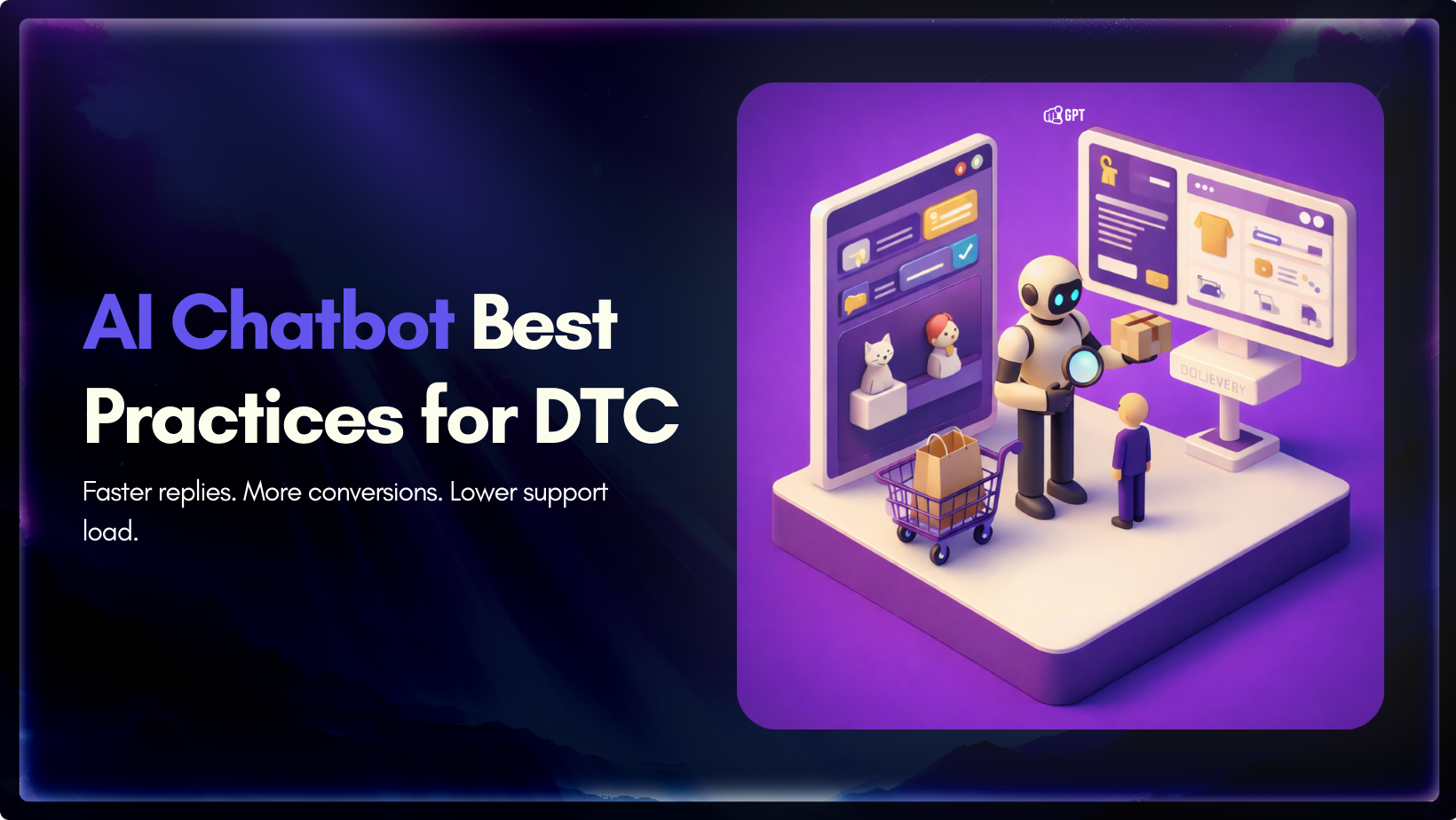
Nearly 70% of shoppers who add something to their cart leave without buying (glued). Some were never serious. But a lot of them had a question, needed a fast answer, and moved on when one did not come. That is the actual problem AI chatbots solve in DTC, when built correctly. A specific shopper, a […]

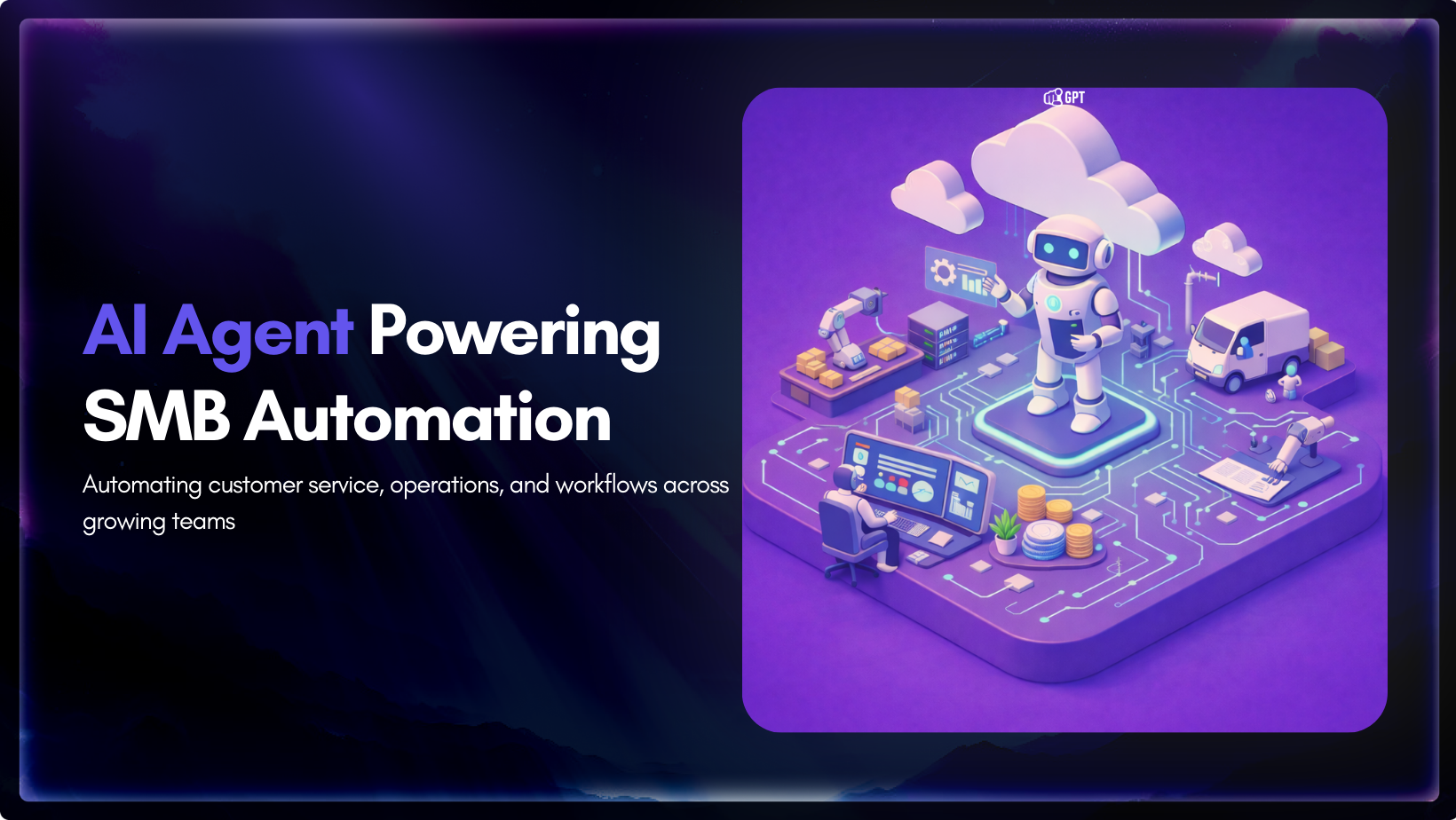
Small and medium businesses are facing a structural shift. Customers expect instant responses. Work happens across dozens of tools. Teams remain lean. Costs keep rising. Yet service quality is expected to match large enterprises. For years, businesses depended on chatbots, helpdesks, and manual workflows. These systems offered limited relief, handling basic questions and ticket routing […]

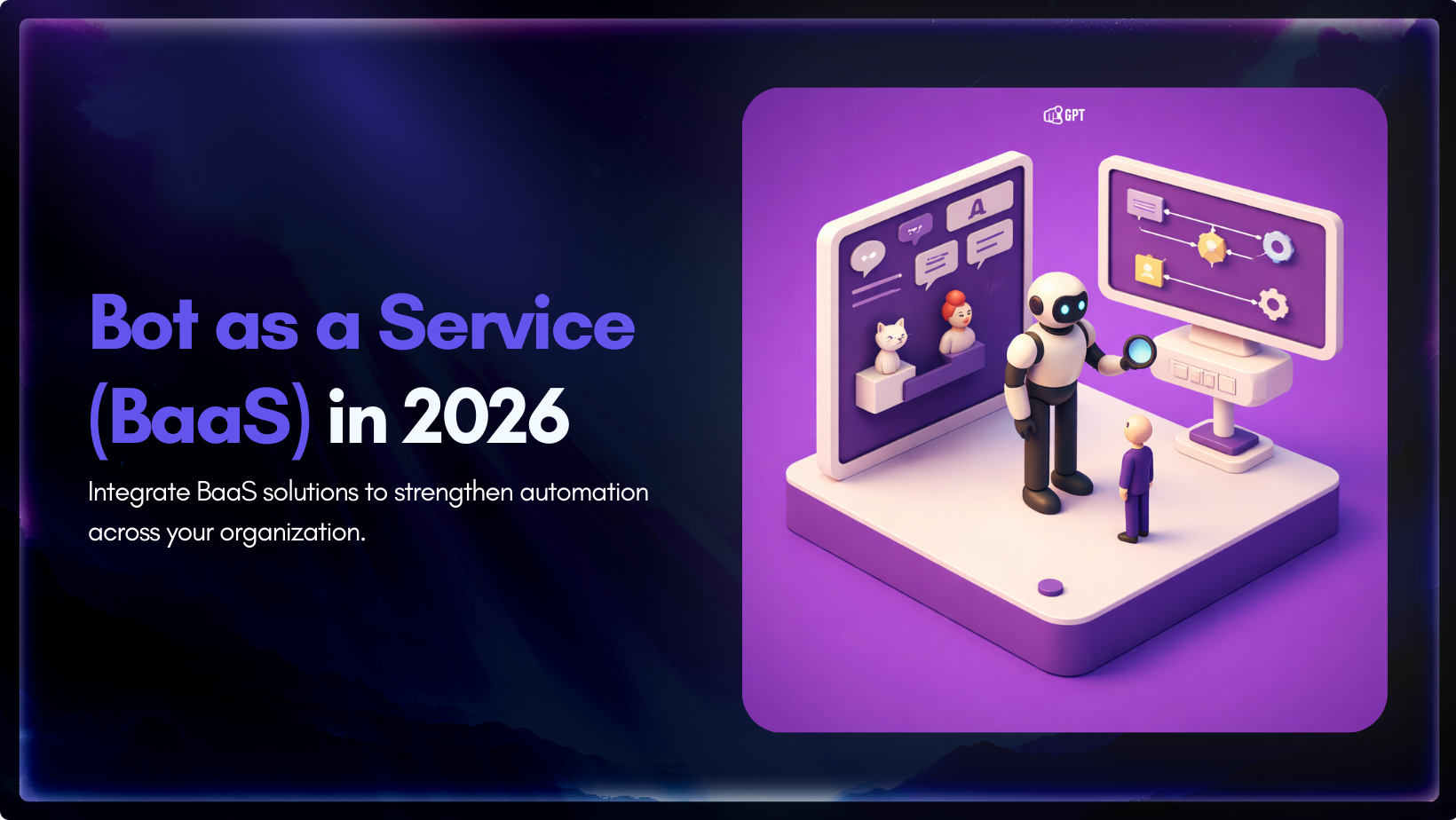
Automation defines how modern enterprises execute, respond, and grow. Customer conversations are handled by AI. Transactions move through automated workflows. Approvals route across departments without manual follow-ups. In high-performing organizations, intelligent systems are embedded directly into revenue operations, service delivery, finance, and internal support. Investment trends confirm this shift. The global conversational AI market surpassed […]

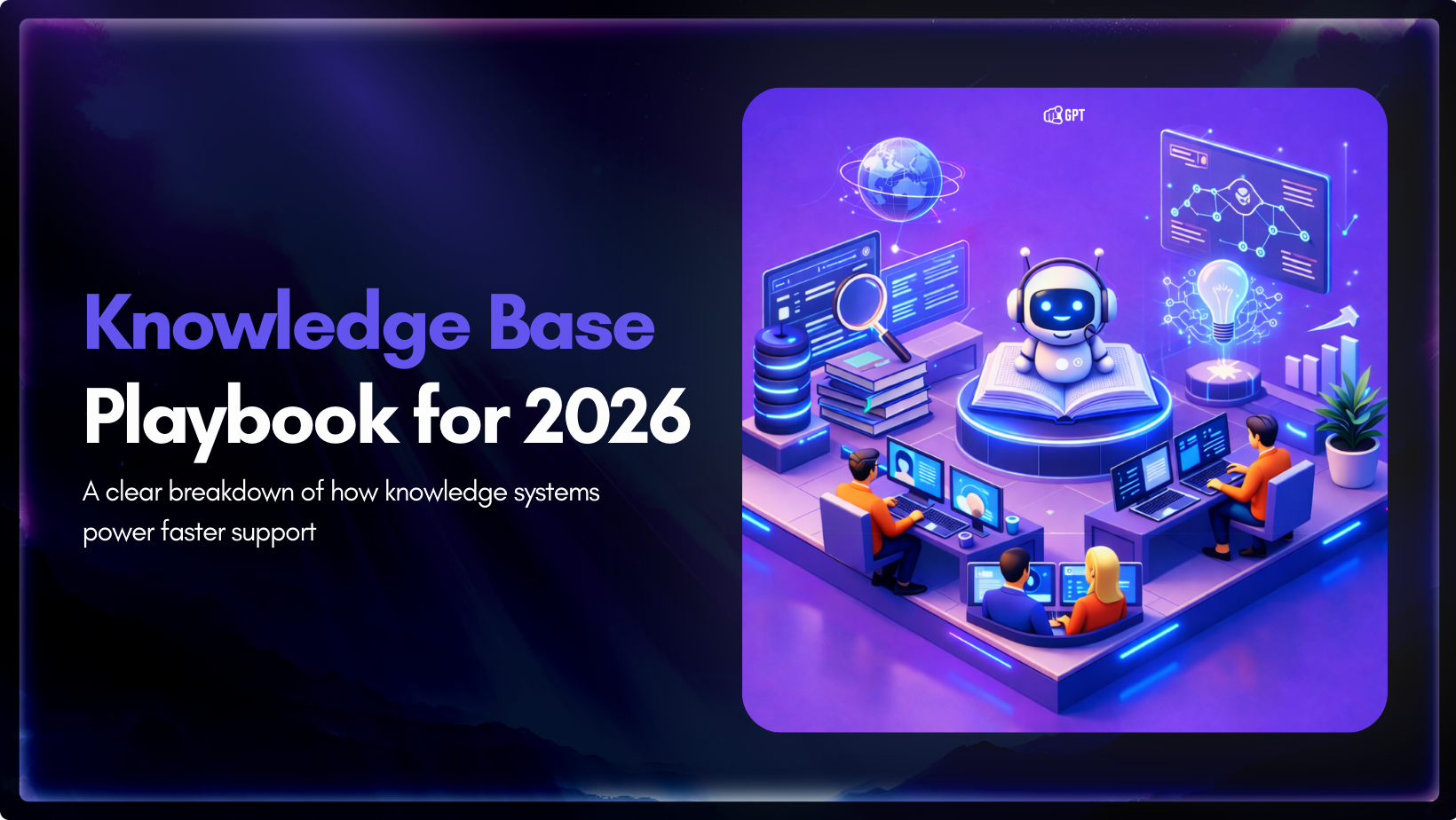
Access to clear, accurate information now sits at the center of customer experience and internal operations. People search first when setting up products, reviewing policies, or resolving issues, making structured knowledge essential for fast, consistent answers. A knowledge base organizes repeatable information such as guides, workflows, documentation, and policies into a searchable system that supports […]

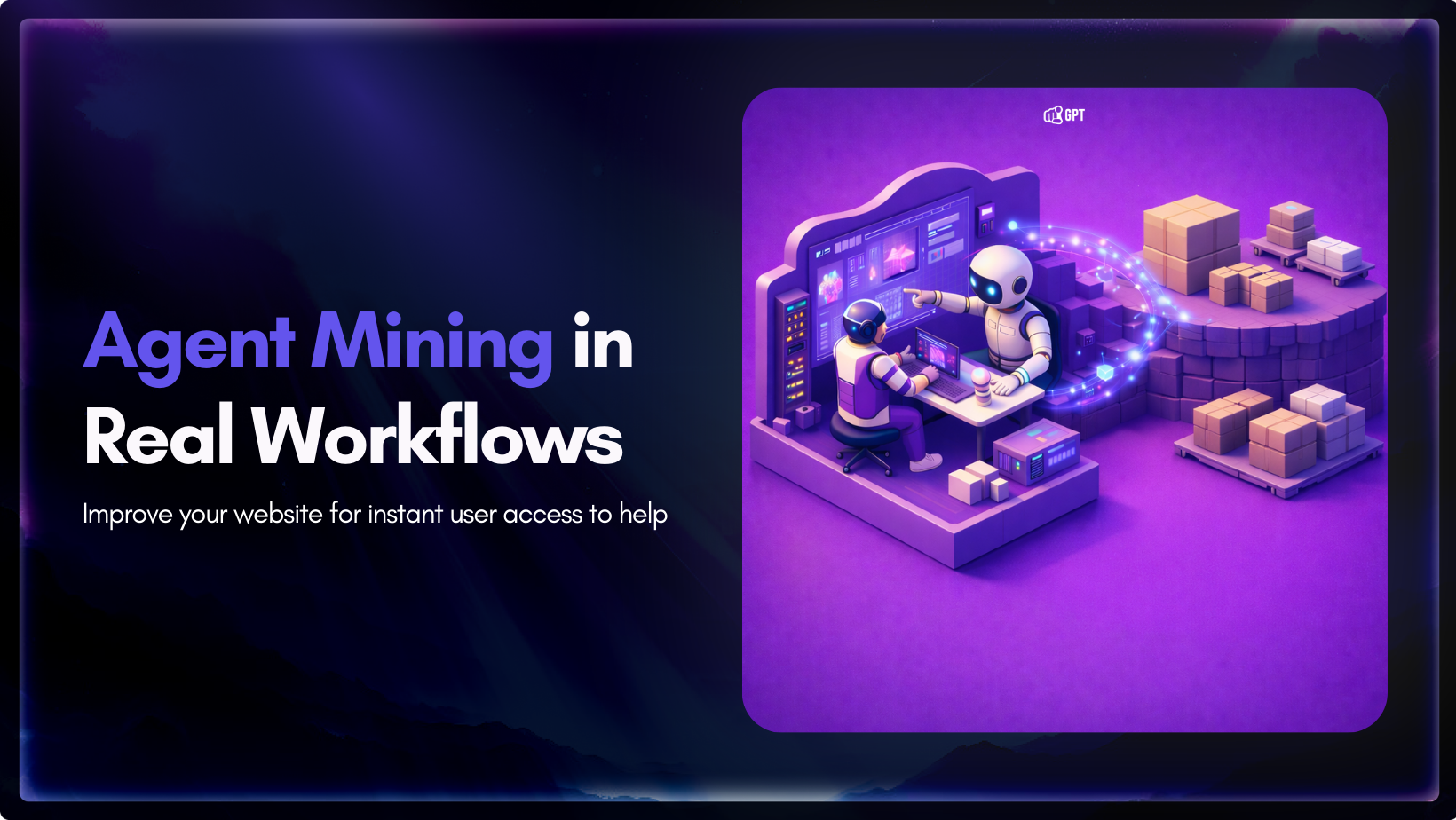
TL;DR Agent mining shifts AI from answering questions to executing real work across systems through controlled, repeatable workflows with verification. By automating repetitive operations with guardrails and observability, agents reduce friction, improve consistency, and let humans focus on decisions and edge cases. For a decade, AI was mostly framed as something that answers. It explains, […]

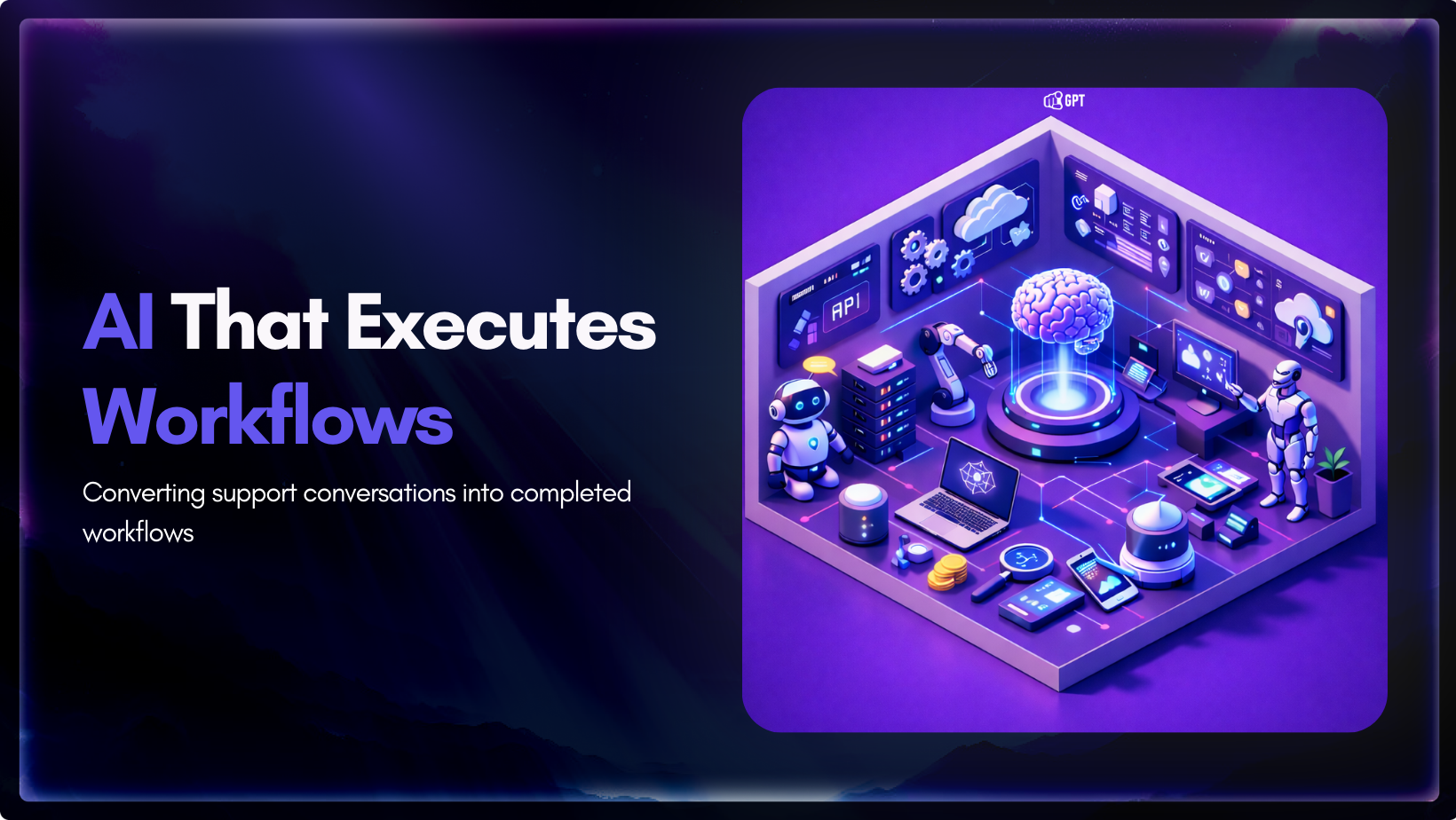
Say “AI” and most people still think ChatGPT. A chat interface where you type a question and get an answer back. Fast, helpful, sometimes impressive. Three years after ChatGPT went viral, surveys show that’s still how most people think about AI. For many, ChatGPT isn’t just an example of AI. It is AI. The entire […]
